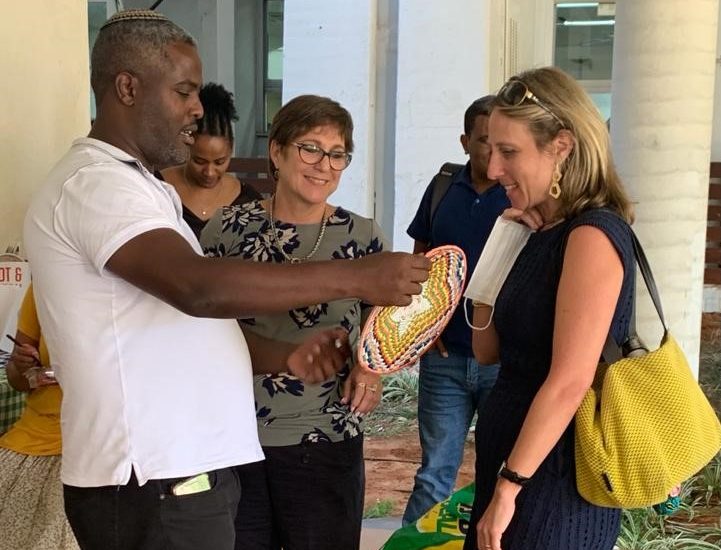One year from now, Montreal entrepreneur Jonathan Goodman plans to be in Ethiopia symbolically retracing the journey thousands of Jews braved to fulfill their dream of reaching Israel.
Goodman hopes at least 50 to 100 Jews from the Diaspora and Israel—philanthropists and activists—join him in this homage to the refugees airlifted in the 1991 rescue mission known as Operation Solomon.
Most importantly, this five-day pilgrimage is intended to raise awareness that more than 30 years later the Beta Israel—Jews of Ethiopian origin—remain socially and economically disadvantaged, and the generation born in Israel is little better off.
Goodman doesn’t mince words: he calls it racism.
The pharmaceutical executive is planning “Walk in Their Shoes” with his sister who lives in Israel, Shawna Goodman Sone, chair of the board of the Morris and Rosalind Goodman Family Foundation, established by their parents.
The siblings aim to raise a minimum US$10 million to create scholarships enabling Israelis of Ethiopian descent to get a higher education at the country’s top institutions: Hebrew University of Jerusalem and Tel Aviv University (TAU).
After flying from Tel Aviv to Addis Ababa, the preliminary itinerary of Walk in Their Shoes has participants heading to Gondar, the area most Jews lived in and still do.
Participants will visit the nearby villages of Ambober and Wolleka, from which many Jews began their arduous trek to Sudan. Ambober is also near Mount Sigd where Jews gathered for the holiday when they prayed for their return to Jerusalem.
Visits will be made to synagogues that have been restored and the Jewish cemetery where some who died on their way to Sudan are buried.
Some regions of Ethiopia are currently embroiled in a violent civil war. Goodman says the trip will avoid areas of conflict.
Participants will hear from those who survived the journey and from those still living in Ethiopia, as well as the young Israeli-born. Ideally, Ethiopians who have been waiting for years to join relatives in Israel will be aboard the flight back to Tel Aviv.
Ethiopians are over-represented in the criminal judicial system, and most still live in poorer regions, few in urban centres and certainly not Tel Aviv or Jerusalem. Studying in those cities will lead to “slow and steady desegregation,” Goodman said.
“I realize not all these facts are the result of racism, but have no doubt that racism played a role in creating this reality.”
Goodman contends there has been a failure of the responsibility to help the 160,000 Israeli Ethiopians integrate into Israeli society and the approximately 10,000 that remain in Ethiopia wanting to make aliyah.
“We continue to deny Beta Israel, our Ethiopian brothers and sisters, the value of their history. And we have failed to set them up for sustainable success and, over time, create more equity in Israeli society,” he said.
“According to a 2019 national census, Israelis of Ethiopian background have an income 35 percent lower than the average Israeli. Only 8 percent of men have an academic degree compared to 29 percent in the rest of Israeli male population,” said Goodman. “When they do successfully complete higher education, they earn about 25 percent less than the average Jewish Israeli.”
Sone, who has lived in Israel seven years and has three children, was “shocked” that the history and culture of the Ethiopians is not taught in schools. Changing the narrative that this community is a problem into a proud and integral part of the Jewish story is at the root of this long-term effort.
Young Ethiopians absorbs the negative attitude. Sone spoke of meeting a woman who worked in a Hebrew University cafeteria and could simply not imagine herself being a student there.
The “Changemakers” who have so far joined Goodman come from the United States, United Kingdom and Israel, as well as Canada. Among them are: Elisha Wiesel (son of the late Elie Wiesel); Israeli solar power entrepreneur Yossi Abramowitz; Yaffa Tegegne, a Montreal lawyer and daughter of the late Baruch Tegegne, one of the first Ethiopians in Israel who clandestinely led others out; Shlomo Berihun, an Ethiopian-Israeli activist; and Natou Suissa, Federation CJA chief development officer.
Since the campaign was launched a year ago, a significant change has occurred, Goodman noted: Hebrew University and TAU are open to its objectives and have appointed deans of diversity.
At present, only 378 Ethiopians attend these two universities combined, or 0.6 percent of the total student body. The figure is only slightly higher at other universities.
The Changemakers want to raise $10 million by the end of next year, with the first three-year scholarships awarded in 2023-2024. About 240 students will each receive $15,000 per year for tuition, living expenses and coaching/job placement. All faculties are eligible with special consideration given to those pursuing Ethiopian studies.
Anyone wishing to join Walk in Their Shoes may contact Goodman at [email protected]
